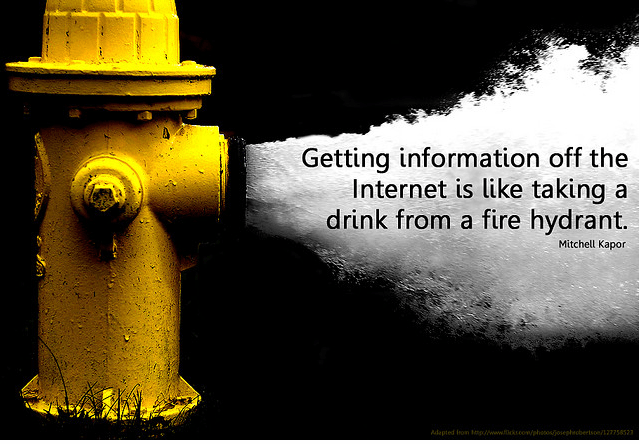
This post first appeared in the San Jose Mercury News
by Larry Magid

I’m suffering from information overload and I’m not alone. A recent report from McKinsey & Company found that the average knowledge worker spends about 28 percent of the workweek managing email. Assuming a 40-hour week, that comes to about 560 hours a year.
For some of us, it might be even worse. I not only manage email when I’m at my desk, but also — much to my wife’s annoyance — often look at email on my smartphone during so-called off hours. Unless I have a good excuse (like “I think the kids may be trying to reach us”), I avoid doing it when we’re out to dinner. But truth be told, I often take a peek on my way to the men’s room if I take a bathroom break during the meal.
The McKinsey report argues that “social technologies” could improve internal communications by “improving collaboration and communication within and across enterprises.” Maybe they’re right when it comes to carefully implementing and monitoring corporate tools, but it certainly isn’t the case with the tools that I and millions of other people use. Facebook, Twitter and LinkedIn simply add to the amount of information coming at us. And thanks to mobile apps, they follow us wherever we go.
My daughter, an elementary schoolteacher, told me last week she plans to delete the Facebook app from her iPhone because she finds herself staring at it too often. Not only does it waste her time, but also sometimes brings her down when she sees pictures of her friends having a great time together. “I need to be living my own life,” she told me, “rather than watching other people live theirs.”
Having to deal with a spigot of information reminds me of trying to find a tool in a crowded garage. Somewhere amid all that junk is my favorite screw driver, but I can never find it because it’s crowded out by things that I don’t really care about. Whenever I clean out my garage, I find a few cherished items but not until I discard all the things that I’ll never use.
It’s not uncommon for me to get a message or a call from someone I care about, asking why I haven’t responded to his or her email. I’ll do a search and, sure enough, there’s an unopened message that I really should have looked at. Sometimes when I go through old mail, I find really important messages I had ignored, like someone offering to pay me to give a speech. Missed email can equate to missed opportunities.
Missing out on Facebook updates or Twitter posts rarely is all that consequential, but the sheer number of people I follow or have “friended” means that posts that actually interest me are likely to be drowned out by ones that I don’t really care about.
There are solutions to this problem. One, of course, is to cut down the number of people you interact with. Unsubscribe from email lists that aren’t essential, unfriend Facebook “friends” who aren’t really friends and unfollow Twitter folks who overwhelm you with too much information. Another is to use available tools to categorize what’s coming at you.
Most email services and programs offer filters that allow you to flag or prioritize mail from certain people or groups. Gmail, for example, has ways to flag messages from people you don’t want to ignore. You can also go to the settings page to create a filter that labels and sorts messages from specific people or groups. You can also mark by domain. For example, I have Gmail configured so that messages from anyone at CBSNews.com or mercurynews.com are not only highlighted but also labeled “VIP” so they appear in a separate folder and are easier to find if I miss them in my inbox.
But even with those tools in place, I still occasionally miss important messages. If I’m wondering why someone hasn’t messaged me or responded to my message, I’ll do a search and — sure enough — often find an unopened message.
Facebook has a number of tools to help filter who you hear from and to control who can see your updates. You can create lists of friends and only display posts from people on those lists, or you can turn some of your friends into “acquaintances” so you’ll still hear from them, but not as often.
Twitter also allows you to create lists that can include people you follow or others you don’t normally follow. I’ve created a list of people I work with closely. You also could create a list of people who Tweet on specific topics of interest and only see their Tweets when you want to focus on that topic.
While all of these tools can help a bit, none will completely eliminate information overload or the stress of living in a society where you’re expected to be on call 24 hours a day. But there’s a tool for that built into just about every device you own. It’s called the On/Off switch.
Be the first to comment